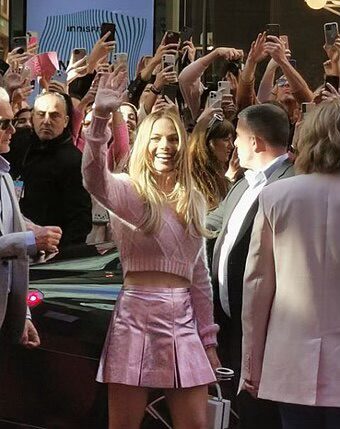I Watched “Barbie” and Have No Idea What Y’all Are Mad About
No movie in recent years has amassed the same level of admiration and aversion from the average cinema-goer as Greta Gerwig’s “Barbie” with some viewers deeming it Best Picture before its release and others claiming it was plain propaganda in support of a femme fatale society of “Jennifer’s Body” worshippers. The fact that “Barbie” recently became Warner Brothers’ highest-grossing global release film at $1.3 billion surely earns it some decent recognition.
What I saw was not modern feminist propaganda or a frivolous chick-flick, but a playfully insightful approach to answering humanity’s deepest questions: Who am I, and what was I made for?
The movie opens up with a nod to Barbie’s creator, Ruth Handler, who noticed that all the dolls that young girls played with were baby dolls. In 1959, “Barbie” took the world by storm and offered girls a chance at creative play where they could make a world that they wanted.
In the movie, Barbieland is a world ruled by the Barbies and cohabitated by the Kens, whose jobs are “just beach.” Barbie wakes up after another “perfect day” and begins to notice that she’s having thoughts and fears of death, depression, flat feet, and cellulite (the average day for a lot of women).
She visits “Weird Barbie” – a character inspired by all the girls who had a Barbie that they demolished for experimentation, myself included – and discovers that she has to find the girl that’s playing with her in the real world and make sure that she’s happy again.
Ken, a stowaway, follows her and experiences the Real World for the first time along with Barbie, and they have vastly different experiences. Ken notices that people pay attention to him more while Barbie constantly feels self-conscious and objectified.
When Ken learns that the Real World is predominately run by men (falsely understanding the concept of patriarchy as purely equestrian), he returns to Barbieland to share what he learned with the other Kens and turns Barbie’s Dreamhouse into a “Mojo Dojo Casa House.”
Meanwhile, Barbie finds the girl who’s playing with her so that she can turn things around. When it’s revealed that it’s actually the girl’s mom who had been playing with Barbie, the mom explains that she had been overwhelmed due to work and her strained relationship with her cynical teenage daughter.
America Ferrera, who portrays mother and Mattel employee Gloria, delivers a classic Greta Gerwig monologue about women and motherhood. This part of the movie seemed to move viewers the most, and I can understand why.
“It is literally impossible to be a woman. […] I’m just so tired of watching myself and every single other woman tie herself into knots so that people will like us. And if all of that is also true for a doll just representing women, then I don’t even know.”
While Barbie received criticism for being both, and simultaneously, anti-man and anti-woman, I found this completely false. While its audience is primarily made up of women, the messages expressed in “Barbie” do not exclusively apply to women.
The heart of Gloria’s monologue is inherently human. I realized that there is a universal experience to feeling like “too much of this” or “not enough of that.” We hold ourselves to labels and standards of ridiculous proportions so much that we lose ourselves in those identities, causing burnout, depression, low self-esteem and a multitude of other mental health issues.
We want our parents to be protective, but not too controlling. We want our professors to be disciplined, but not too strict. Women should be loving, but not too overbearing. Men should be forward, but not too assertive.
It’s okay to have preferences and wants, but humans are much too complex to fit into any kind of box. And it’s embarrassing how long we’ve gone without realizing the damage caused by the often ridiculous and impossible expectations we have of each other.
The topics in “Barbie” are much too complex for 800 words. I thought it was appropriately rated, and it left me with ideas I’ll be contemplating for the rest of my life. I also love that it was an opportunity to get people excited about going to the movie theaters with the rise of ‘Big Stream’.
Furthermore, I believe “Barbie” is not about toxic masculinity or that women should run the world á la Beyoncé. It’s about seeing the beautiful, bad and ugly aspects of being human and choosing to live anyway.
The reality is that humans run the world, and we should make more effort to realize that we all have unique struggles, thoughts, ideas and experiences. The last thing I want to leave you with is that despite all of your faults and weaknesses, you are “Ken-ough.”
